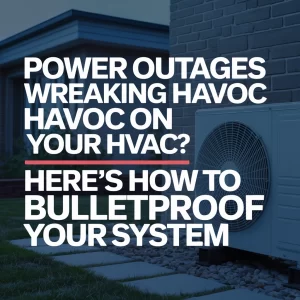Power Outages Wreaking Havoc on Your HVAC? Here's How to Bulletproof Your System

Power outages are more than just an inconvenience: they can be a costly nightmare for your HVAC system. When the lights go out and come back on, the electrical surge that follows can fry expensive components, leaving you with repair bills that could have been easily prevented.
If you're tired of watching your HVAC system take a beating every time Mother Nature throws a curveball, you're in the right place. Let's walk through exactly how to protect your investment and keep your system running smoothly, no matter what the power grid throws at you. At South Jersey Heating and Cooling, we help commercial properties across Southern New Jersey harden their HVAC systems against outages, surges, and voltage swings so you can safeguard uptime and avoid costly repairs.
Understanding the Real Threat to Your HVAC System
The moment your power cuts out, your HVAC system faces multiple threats that most people never consider. It's not just the outage itself: it's what happens when power returns that causes the real damage.
Power surges are the biggest culprit. When electricity comes rushing back, it often arrives with more voltage than your system is designed to handle. This sudden spike can destroy circuit boards, burn out motors, and damage sensitive electronic controls that cost thousands to replace. South Jersey Heating and Cooling routinely sees surge events take out control boards and compressors in seconds—prevention is always less expensive than replacement.
But there's another problem: voltage fluctuations. As the power grid struggles to stabilize after an outage, your HVAC system experiences a roller coaster of electrical inconsistencies. These fluctuations stress components and can cause premature failure even if they survive the initial surge.
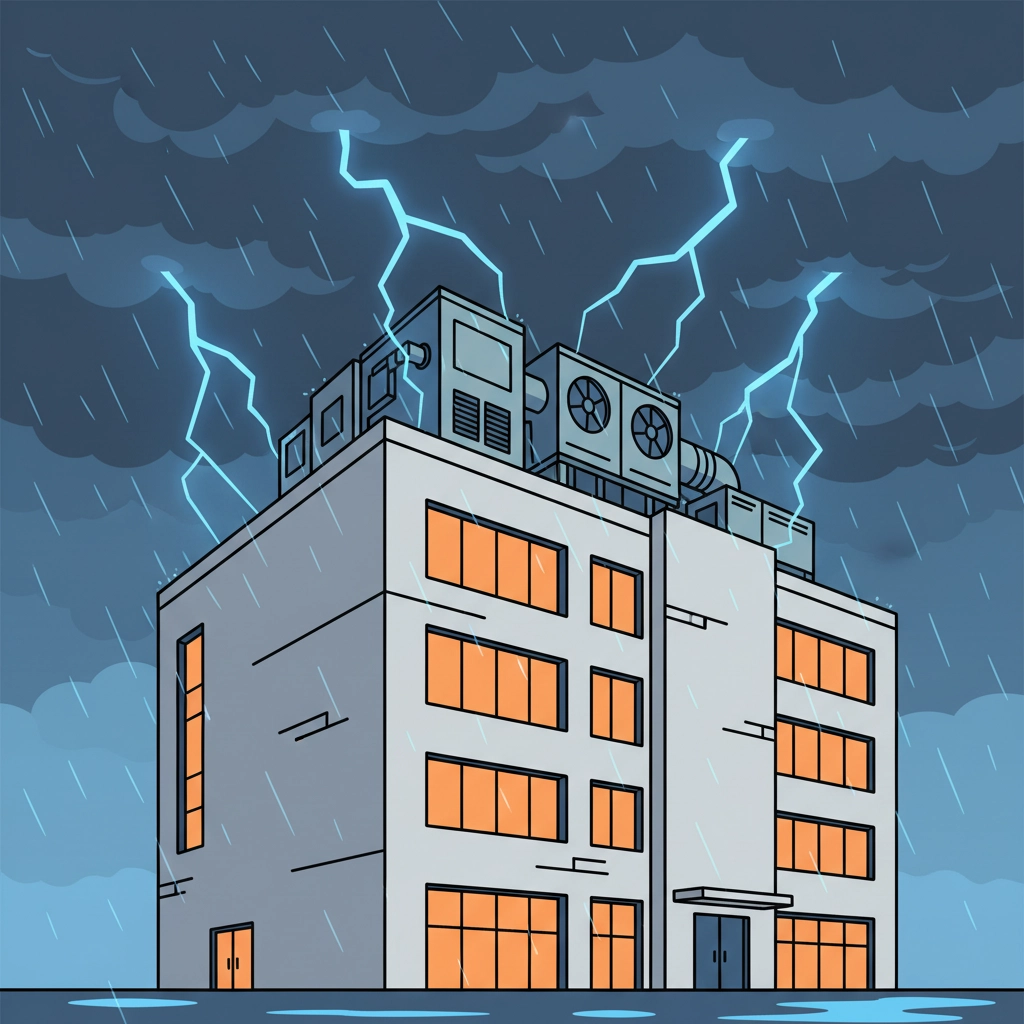
Your First Line of Defense: Immediate Actions During Outages
When the power goes out, every second counts in protecting your HVAC system. Your immediate response can mean the difference between minor inconvenience and major repairs. South Jersey Heating and Cooling recommends documenting these steps and training your team so they're automatic during an outage.
Switch your thermostat to "off" the moment power goes out. This prevents your system from automatically restarting when power returns, which is when most damage occurs. Don't wait: do this first, even before checking on other priorities.
Next, turn off the circuit breaker that controls your HVAC system. This creates an additional barrier between your equipment and any power surges that might occur during restoration. Think of it as disconnecting your system entirely from the electrical chaos that's about to unfold.
Unplug any non-essential appliances throughout your building. This reduces the overall electrical load on your system when power returns and minimizes the risk of voltage spikes affecting your HVAC equipment.
The Smart Restart: Bringing Your System Back Online Safely
Once power returns, resist every instinct to immediately fire up your HVAC system. The power grid needs time to stabilize, and rushing this process puts your equipment at serious risk.
Wait at least 30 minutes after power restoration before touching anything. Use this time to let the electrical system settle and ensure consistent voltage levels. This waiting period has saved countless systems from surge damage. South Jersey Heating and Cooling technicians use this same stabilization window on commercial sites to protect critical equipment.
When you're ready to restart, follow this sequence: First, turn the circuit breaker back on. Wait another few minutes, then switch your thermostat from "off" to your desired temperature setting. This gradual approach reduces stress on your system during startup.
If your thermostat doesn't respond after following these steps, check the batteries if it's battery-powered. For hardwired units, inspect for blown fuses and replace them as necessary. Sometimes the simplest fixes solve the biggest problems.
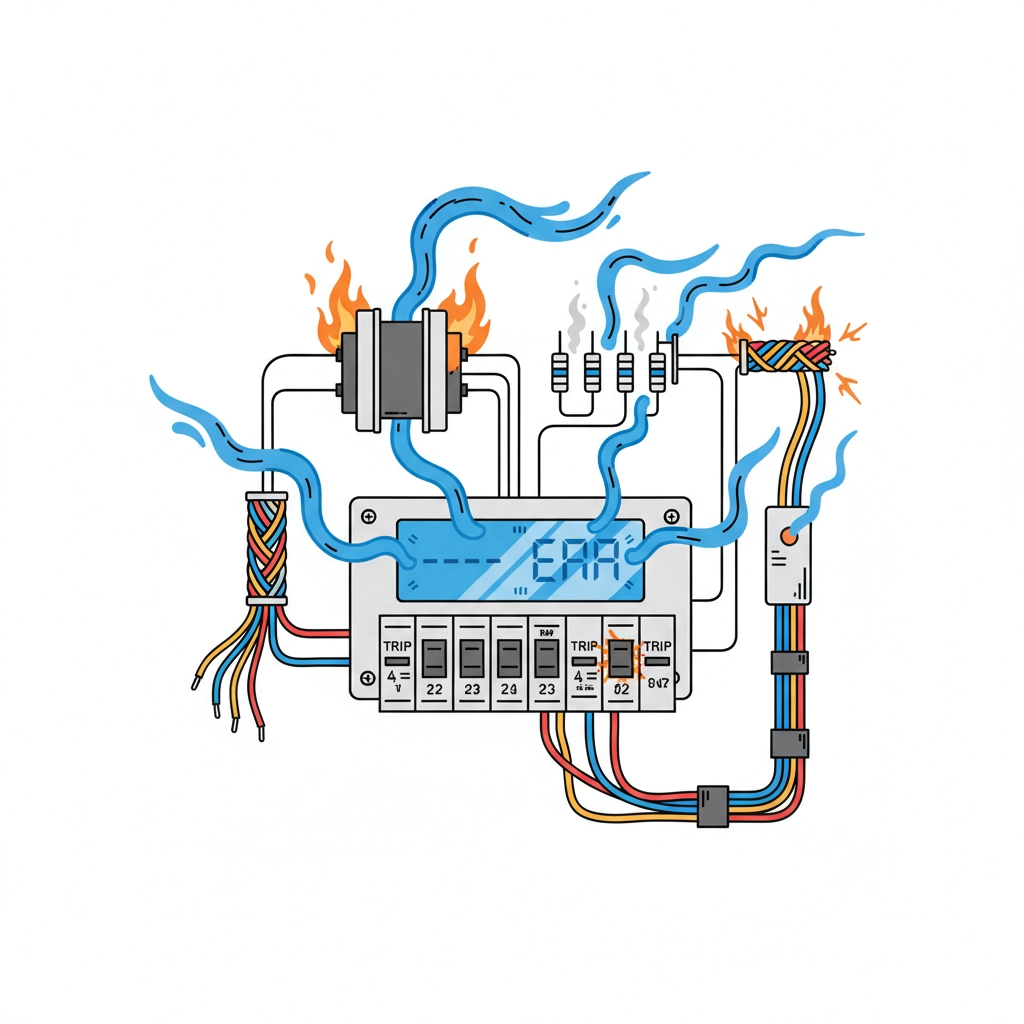
Surge Protection: Your System's Insurance Policy
Installing surge protection devices is one of the smartest investments you can make for your HVAC system. These devices act as electronic bodyguards, standing between harmful voltage spikes and your expensive equipment. South Jersey Heating and Cooling can specify and install facility-wide and unit-level surge protection designed for commercial loads.
Whole-house surge protectors installed at your main electrical panel provide comprehensive protection for your entire facility, including your HVAC system. These units monitor incoming electricity and divert dangerous surges away from your equipment before they can cause damage.
For additional protection, consider dedicated surge protectors specifically designed for HVAC equipment. These devices install directly at your unit and provide an extra layer of defense against voltage spikes that might slip through your main protection.
Don't overlook control wiring protection. Installing surge protection devices inline with control wiring creates defensive barriers that shield delicate electronic components from voltage spikes. These components are often the most expensive to replace and the most vulnerable to surge damage.
Backup Power: Keeping Your System Running When the Grid Fails
If your area experiences frequent power outages, backup generators can be a game-changer for maintaining comfortable conditions and protecting your HVAC investment.
Home standby generators automatically detect power losses and seamlessly switch your HVAC system to backup power. This eliminates the shutdown and startup cycle that causes most power-related damage. Your system keeps running as if nothing happened.
When selecting a generator, ensure it's properly sized for your HVAC load plus other essential systems. An undersized generator can create voltage problems that damage the very equipment you're trying to protect. Have a qualified professional calculate your power requirements and recommend appropriate generator capacity.
Professional installation is crucial for generator systems. Improper installation can create safety hazards and may not provide the protection you need during critical moments. Work with licensed electricians who understand both generators and HVAC systems.
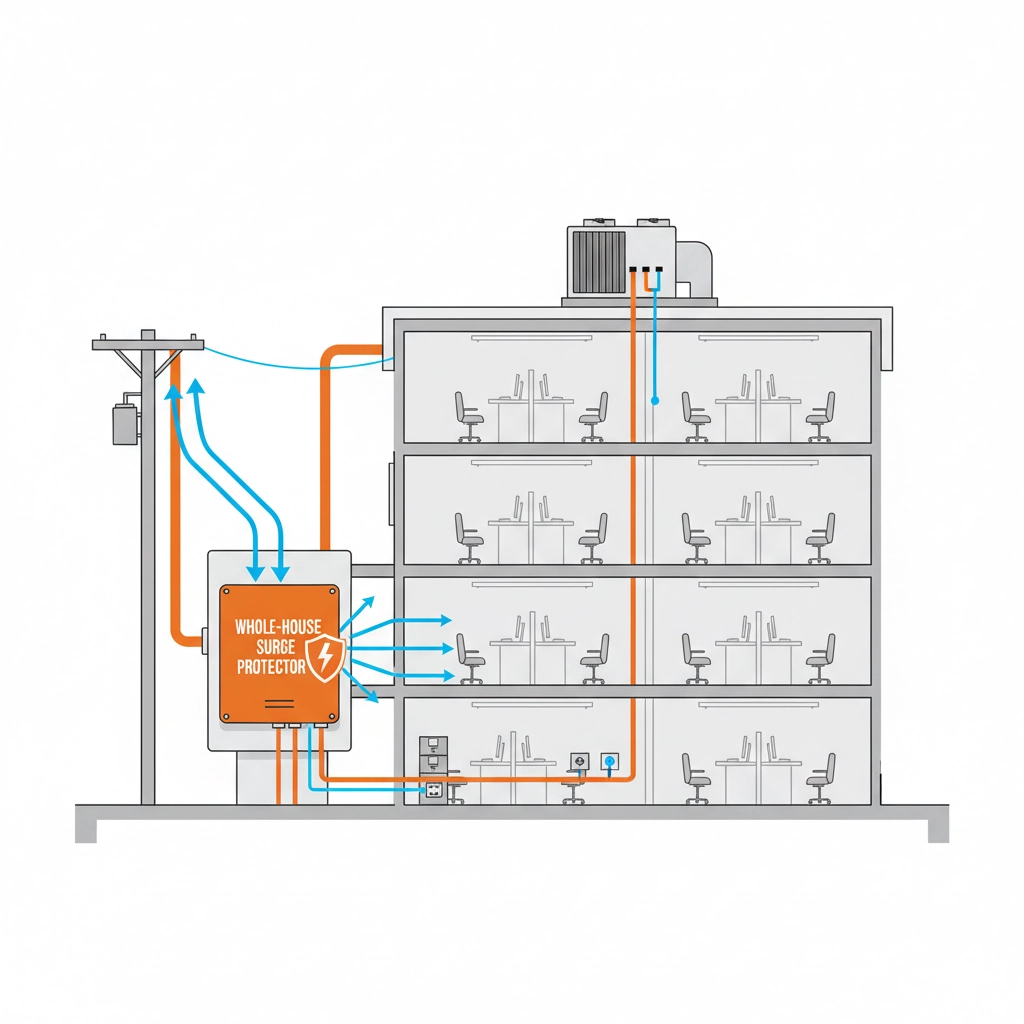
Preventative Maintenance: The Foundation of System Protection
Regular maintenance is your best defense against power-related damage and ensures your system operates efficiently when it matters most. A well-maintained system is more resilient to electrical stress and recovers better from power events.
Keep your system clean and well-serviced. Dirty coils and clogged filters force your system to work harder, making it more susceptible to damage during power fluctuations. Regular cleaning reduces operational stress and improves surge resistance.
Monitor electrical connections during routine maintenance visits. Loose connections create resistance points that generate heat and increase vulnerability to surge damage. Tightening connections and replacing worn components prevents small problems from becoming major failures.
Ensure proper refrigerant levels and inspect electrical components regularly. Low refrigerant forces compressors to work harder, while worn electrical components are more likely to fail during power events. Address these issues before they compromise your system's surge resistance.
Consider scheduling professional maintenance through a commercial maintenance agreement to ensure consistent care and early problem detection.
Smart Upgrades for Long-Term Protection
Investing in modern, surge-resistant equipment and infrastructure improvements can significantly reduce your vulnerability to power-related damage.
Upgrade to high-quality wiring and electrical components throughout your HVAC system. Modern wiring with proper grounding and surge-resistant components provides better protection against electrical events. Have these upgrades performed by skilled electricians who understand HVAC-specific requirements.
Smart HVAC controls with built-in surge protection offer advanced features that help protect your system. These controls often include diagnostic capabilities that can alert you to electrical problems before they cause component failures.
Consider upgrading to variable-speed equipment that's designed to handle voltage fluctuations better than single-speed units. These systems often include built-in protection features and are more resilient to electrical stress.
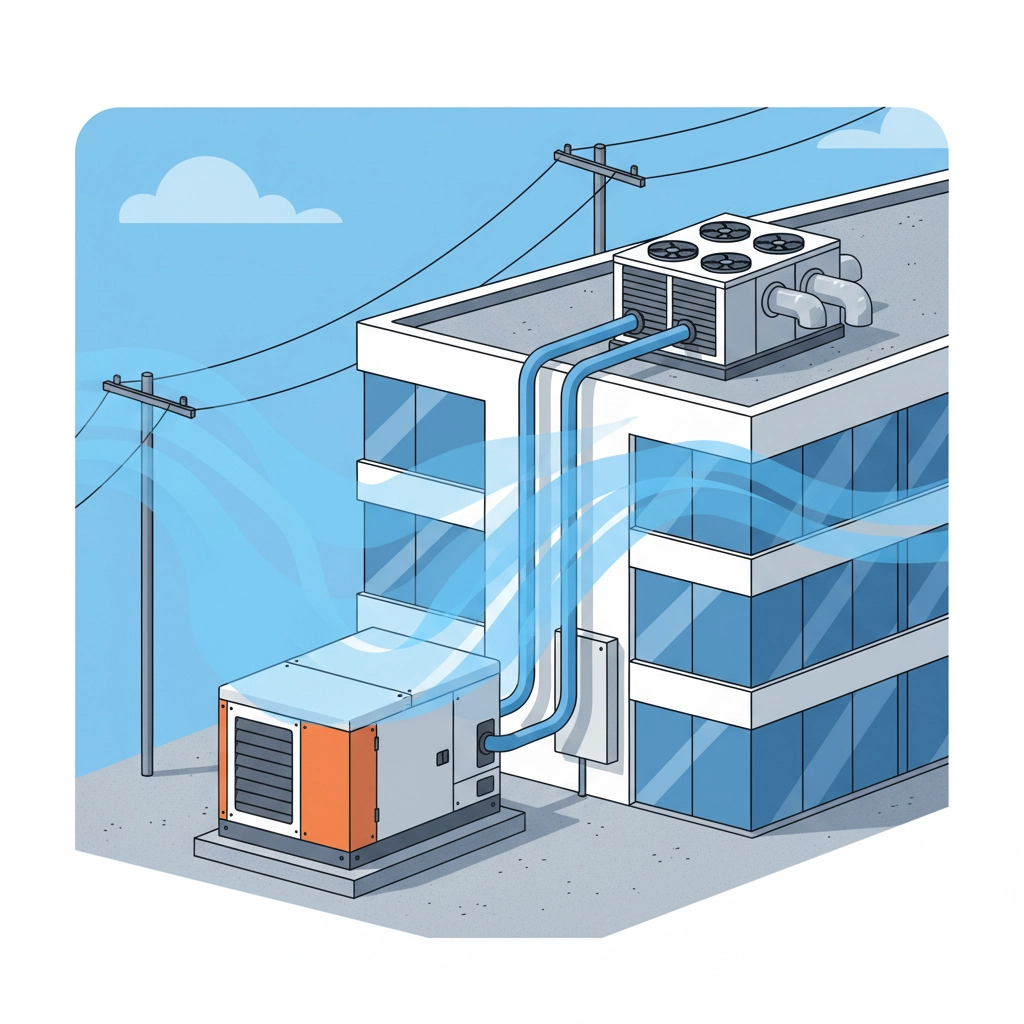
Professional Assessment and Installation
While some protective measures can be implemented independently, others require professional expertise to ensure proper installation and maximum effectiveness.
Have a qualified HVAC technician, like the team at South Jersey Heating and Cooling, assess your current system's vulnerability to power-related damage. They can identify weak points and recommend specific protective measures based on your equipment and local power conditions.
Professional installation ensures that surge protection devices, generators, and electrical upgrades work together effectively. Improper installation can reduce protection effectiveness or create new vulnerabilities that compromise your system.
Regular professional inspections help identify developing problems before they leave your system vulnerable to power-related damage. Schedule these assessments as part of your overall maintenance strategy.
Taking Action to Protect Your Investment
Power outages don't have to mean HVAC disasters. By combining immediate protective actions with long-term infrastructure improvements, you can significantly reduce your risk of power-related damage.
Start with the basics: establish proper shutdown and restart procedures for your team. Then invest in surge protection devices appropriate for your system size and vulnerability. For areas with frequent outages, consider backup power solutions.
The cost of protection is always less than the cost of replacement. Don't wait for the next power event to damage your system: take action now to bulletproof your HVAC investment.
Ready to protect your HVAC system from power-related damage? Contact South Jersey Heating and Cooling for a professional assessment of your system's vulnerabilities and recommendations for effective protection strategies. Request service today to safeguard your investment.
For commercial HVAC emergencies or service inquiries, call South Jersey Heating and Cooling at 609-488-2253.



